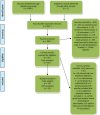The Effectiveness of Cognitive Bias Modification Interventions for Substance Addictions: A Meta-Analysis
- PMID: 27611692
- PMCID: PMC5017662
- DOI: 10.1371/journal.pone.0162226
The Effectiveness of Cognitive Bias Modification Interventions for Substance Addictions: A Meta-Analysis
Abstract
Background and aims: Cognitive bias modification (CBM) interventions, presumably targeting automatic processes, are considered particularly promising for addictions. We conducted a meta-analysis examining randomized controlled trials (RCTs) of CBM for substance addiction outcomes.
Methods: Studies were identified through systematic searches in bibliographical databases. We included RCTs of CBM interventions, alone or in combination with other treatments, for any type of addiction. We examined trial risk of bias, publication bias and possible moderators. Effects sizes were computed for post-test and follow-up, using a random-effects model. We grouped outcome measures and reported results for addiction (all related measures), craving and cognitive bias.
Results: We identified 25 trials, 18 for alcohol problems, and 7 for smoking. At post-test, there was no significant effect of CBM for addiction, g = 0.08 (95% CI -0.02 to 0.18) or craving, g = 0.05 (95% CI -0.06 to 0.16), but there was a significant, moderate effect on cognitive bias, g = 0.60 (95% CI 0.39 to 0.79). Results were similar for alcohol and smoking outcomes taken separately. Follow-up addiction outcomes were reported in 7 trials, resulting in a small but significant effect of CBM, g = 0.18 (95% CI 0.03 to 0.32). Results for addiction and craving did not differ by substance type, sample type, delivery setting, bias targeted or number of sessions. Risk of bias was high or uncertain in most trials, for most criteria considered. Meta-regression analyses revealed significant inverse relationships between risk of bias and effect sizes for addiction outcomes and craving. The relationship between cognitive bias and respectively addiction ESs was not significant. There was consistent evidence of publication bias in the form of funnel plot asymmetry.
Conclusions: Our results cast serious doubts on the clinical utility of CBM interventions for addiction problems, but sounder methodological trials are necessary before this issue can be settled. We found no indication that positive effects on biases translate into effects on addiction outcomes.
Conflict of interest statement
The authors have declared that no competing interests exist.
Figures




References
-
- Carey B. Feeling Anxious? Soon There Will Be an App for That. The New York Times. 13 Feb 2012. Available: http://www.nytimes.com/2012/02/14/health/feeling-anxious-soon-there-will.... Accessed 6 Dec 2013.
-
- Cristea IA, Kok RN, Cuijpers P. The efficacy of cognitive bias modification interventions in anxiety and depression: A metaanalysis. Br J Psychiatry. in press; - PubMed
Publication types
MeSH terms
LinkOut - more resources
Full Text Sources
Other Literature Sources
Medical
Miscellaneous

